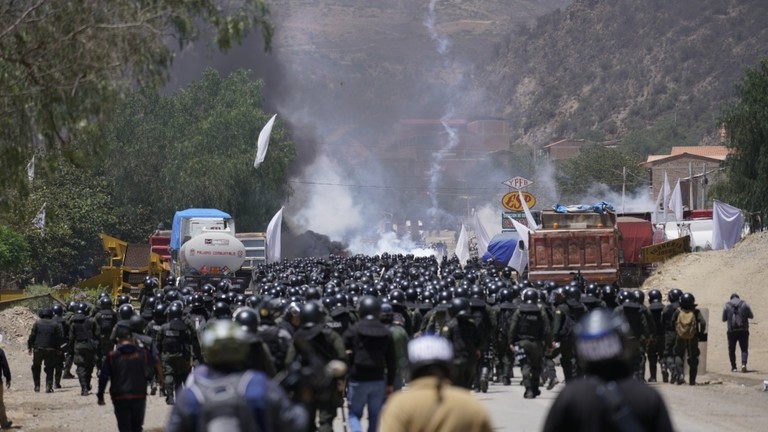World
Ex-Bolivian President on Hunger Strike as Supporter Riots Escalate (VIDEOS)

As tensions rise in Bolivia, a former president’s hunger strike has sparked widespread riots among his followers, bringing chaos to the streets.
On Friday, former Bolivian president Evo Morales announced a hunger strike amid rising tensions between his supporters and the government.
For 19 days, groups supporting Morales have been blocking major roads while protesting against President Luis Arce’s economic policies. They accuse the government of unfairly prosecuting the former leader.
“We are against bloodshed and have consistently pursued genuine dialogue,” Morales posted on X, appealing to activists to “pause” their efforts in establishing roadblocks.
“In the interim, we will begin a hunger strike. The government needs to remove all military and police forces,” stated the former president. He called on the government to engage in dialogue regarding “economic and political issues” and vowed to seek mediation from “international organizations and allied nations.”
The request followed an ultimatum from Arce on Wednesday, warning that the government would “exercise its constitutional powers” if the roadblocks were not cleared. By Friday, police had taken down several barricades set up along a highway linking Cochabamba with western regions of the Andean nation.
“Our government has consistently advocated for dialogue,” stated Arce. “However, meaningful conversation cannot occur while the economic stability of Bolivian families is under threat and their rights to access essentials like food, fuel, and medicine are infringed upon.” Health Minister Maria Rene Castro reported that at least 19 police officers have been hospitalized following confrontations with protesters near Parotani.
In a separate statement on Friday, Arce announced that “armed groups linked to Evo Morales” had taken control of three military bases in Cochabamba province and held soldiers along with their families hostage. There have been no reports of casualties.
The Armed Forces of Bolivia have commanded the “irregular armed groups” to disband, cautioning that “bearing arms against the homeland is viewed as treason,” which endangers “the country’s security and sovereignty.”
A video shared on social media allegedly depicts the captured military personnel encircled by individuals wielding sharpened sticks.
A dynamic left-wing leader, Morales initially became president in 2006 and left the country in 2019 during extensive protests and riots triggered by allegations of electoral fraud. He subsequently alleged that he was targeted by a US-supported “coup.”
Arce was elected in 2020, initially as an ally of Morales. However, they soon became bitter rivals, clashing over control of the Movement for Socialism party (MAS).
In the past month, a Bolivian court issued an arrest warrant for Morales on charges of “aggravated rape with human trafficking,” alleging he had sexual relations with a minor. The former president has denied these accusations, claiming that the prosecution is politically motivated.
Morales has claimed that the government attempted to assassinate him after his car was hit by bullets on Sunday. The Arce administration refuted this allegation, with Government Minister Eduardo del Castillo accusing Morales of “orchestrating” an assassination attempt himself.
Protests over the deteriorating economic conditions have tarnished Arce’s leadership. On June 26, 2024, a faction of dissatisfied officers stationed armored vehicles in downtown La Paz but retracted them later that day following international pressure and condemnation from Arce.
